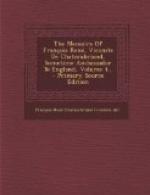|
This section contains 6,093 words (approx. 21 pages at 300 words per page) |

|
SOURCE: Malakis, Emile. “Chateaubriand's Contribution to Philhellenism.” Modern Philology 26 (August 1928): 91-105.
In the following essay, Malakis examines Chateaubriand's interest in Greece and its language using a biographical approach. Malakis also considers the contributions of Chateaubriand's Itinerary to the Greek liberation movement.
Between the years 1820 and 1830 an ardent enthusiasm was expressed in France for the emancipation of Greece.1 The feeling was widespread and varied. Society had its Philhellenism with banquets and concerts, expositions of paintings and plays for the benefit of the Palikares; there was a religious Philhellenism which supported the Christian Greeks against the Musulman Turks; a liberal Philhellenism that supported subjects in revolt against a despotical suzerain; a romantic Philhellenism, interested in the mysterious and things unfamiliar, which identified the Palikares with Carbonari; and, lastly, a literary Philhellenism inspired chiefly by classical memories.2 Chateaubriand, who participated in almost every movement during the Empire and Restoration, took an...
|
This section contains 6,093 words (approx. 21 pages at 300 words per page) |

|


